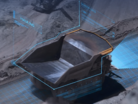Ception's AI MineCept system aims to cut mining accidents

Israeli startup Ception has unveiled an AI-based system that aims to reduce accidents and improve productivity of heavy equipment at mines and quarries.
Accidents include collisions, overturning, and falling into chasms, costing lives, and damaging property. Moreover, operations without advanced technological equipment are inefficient, incurring heavy and unnecessary costs, and prolong the time needed to complete projects.
MineCept develops full situational awareness
To tackle the heavy equipment challenges, Ception developed MineCept. The system is based on a SaaS business model, which offers the customer a collection of apps via the same hardware kit and supports a wide range of scenarios in the field.
It uses advanced real-time high-definition 3D mapping and precise positioning technology, based on visual feed rather than GPS, to provide full situational awareness of the machine's surrounding environment by cross-referencing information from different sensors and a range of image processing algorithms and deep learning.
MineCept, which is installed on the heavy vehicles, provides operators, site managers and safety managers real-time information and insights to improve safety and operational efficiency in general.
MineCept includes three parts. The first is a modular hardware kit that is easily installed on heavy equipment and is OEM-agnostic, and includes a compute unit, communications component, and sensors. The basic kit includes cameras with an option of adding Lidar and radar sensors based on the application and the user requirements.
The second part is an assistance system for the machine's operator, which includes a display screen installed in the operator's cabin. This system provides visual and sound alerts, as well as support for different operational tasks. The third element is the site management system, which includes real-time information and insights about developments on site.
MineCept's management system obtains a comprehensive holistic picture of all the operational and safety parameters and summarizes the hazards (potholes, puddles, rocks, etc.) and events at the site for the manager in an accessible way. Above this level, the AI tools provide insights and enable the forecasting of bottlenecks in the different processes and safety failure points before they occur (preventative safety).
For example, if heavy vehicles or a heavy vehicle and a person get too close, an alarm is immediately sent to the operators so they can avoid a collision, or if a heavy equipment operator is momentarily distracted, causing him to go off the road or move in reverse towards a chasm, he will get a life-saving warning.
MineCept aims to fill technology solutions gaps and solve reliability problems
The system contributes to streamlining operations by supporting diverse apps, such as performance monitoring, comparing planning to execution in the field, measuring the volume of stockpiles, and monitoring cycle times. At the same time, MineCept verifies that the site is operating in compliance with regulatory safety instructions, such as continuous measurement of the height of safety berms.
In the mining industry, MineCept is used by ICL Group, one of the world's leading fertilisers producers, which operates heavy equipment at its phosphate mine in southern Israel. In the field of construction and infrastructure, MineCept has also been adopted by Netivei Israel, the national transport infrastructure company, as a part of a project aimed at improving the safety and efficiency of heavy equipment. Ception is also collaborating with Cemex's Israeli subsidiary, Readymix Industries.
Tal Israel, Co-Founder and CEO of Ception - which to date has received $7mn funding - said the mining and quarrying industries are huge markets that suffer from acute safety, efficiency, and sustainability problems and are always looking for innovative solutions.
"There is currently a gap of technological solutions in this discipline," he said. "Some of the solutions are geared towards a high level of automation, but suffer from various barriers, including technological limitations, high prices, and regulatory restrictions. Conversely, solutions that rely on basic technologies do not offer an adequate response and suffer from serious reliability problems.
"The automation and Industry 4.0 revolutions have brought immense technological advances in edge computing, sensing technologies, artificial intelligence, deep learning, and other fields."
He added Ception is not waiting for the automation revolution to be complete and is applying these innovative technologies to provide precise and reliable solutions "at good prices".



